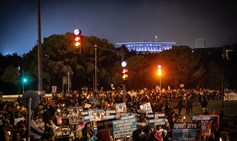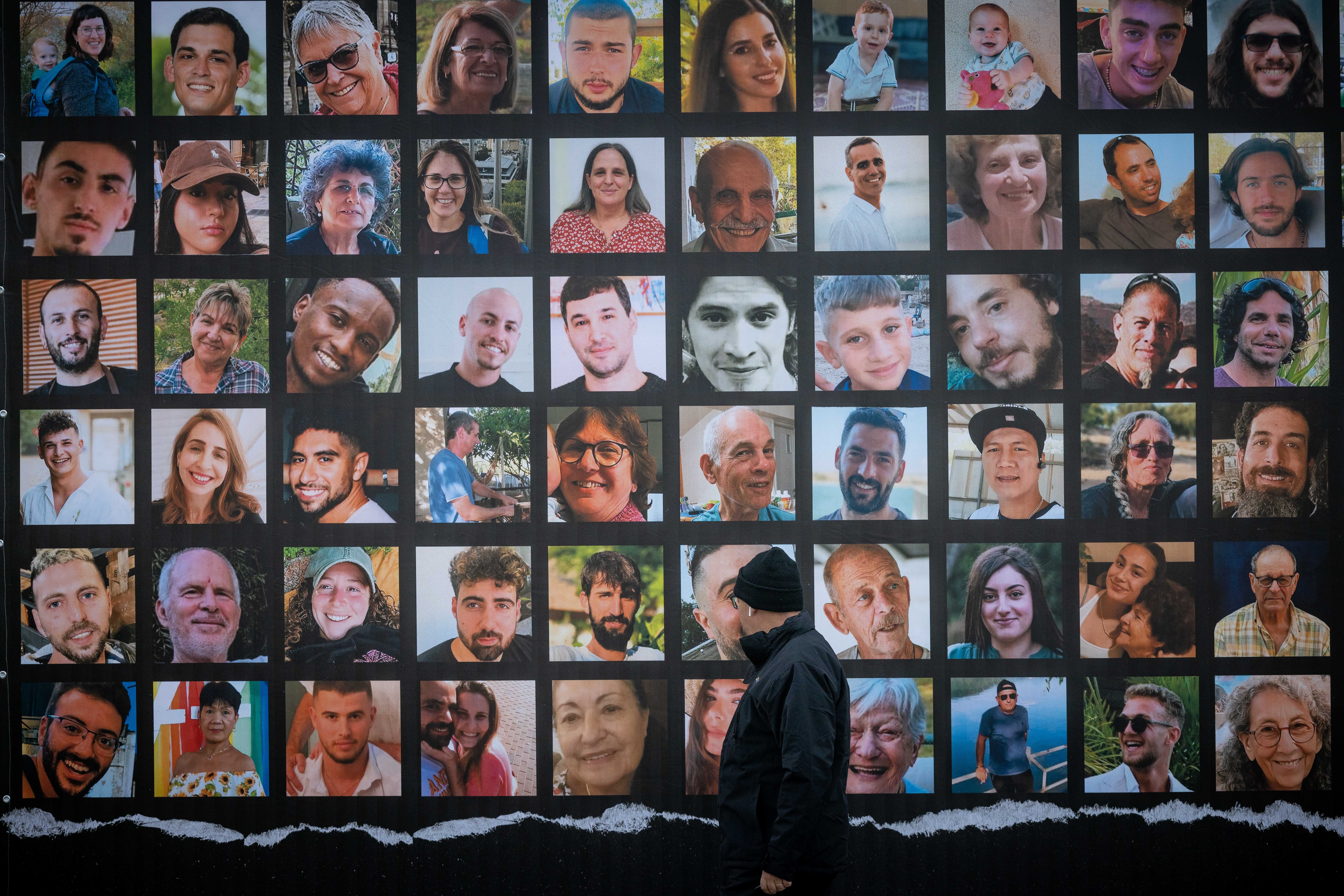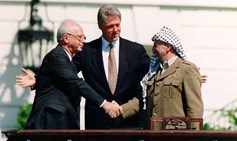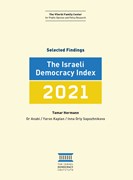

Publications Regarding Israeli Voice Index
Articles

Israelis Divided on How to Handle the Iran Nuclear Program
Written By: Prof. Tamar Hermann, Dr. Lior Yohanani, Yaron Kaplan, Inna Orly Sapozhnikova
62.5% of Jewish Israelis are pessimistic that a deal for the release of all the hostages will be reached soon; a larger share of Israelis (45%) think that Israel should strike Iran’s nuclear facilities even without American backing; As we approach Israel’s 77th Independence Day, 48% of Israelis think Israel has had more successes than failures throughout the years.

Large and Increasing Majority of Israelis Prioritize Bringing Hostages Home Over Toppling Hamas
Written By: Prof. Tamar Hermann, Dr. Lior Yohanani, Yaron Kaplan, Inna Orly Sapozhnikova
Prioritization of the hostages has been increasing steadily over time, with 68% prioritizing the hostages and 25% prioritizing toppling Hamas in the current survey; 49% of Israelis do not think achieving both war goals simultaneously is possible. A majority of Israelis, (56.5%), say the government should obey the Supreme Court decision on Ronen Bar's dismissal.

A Large Majority of Israelis Support Proceeding to the Second Stage of the Ceasefire Agreement
Written By: Prof. Tamar Hermann, Dr. Lior Yohanani, Yaron Kaplan, Inna Orly Sapozhnikova
More Israelis (43%) think Hamas' interests have been served better in the first stage of the ceasefire agreement than Israel's (21%); however, a majority still supports proceeding to the next stage (70%) if the first stage is completed as agreed; a vast majority of Israelis (72.5%) think the ceasefire agreement was achieved thanks to President Trump's intervention.

Israelis Divided on Whether Netanyahu Can Fully Function as Wartime Prime Minister While Testifying on Trial
Written By: Prof. Tamar Hermann, Dr. Lior Yohanani, Yaron Kaplan, Inna Orly Sapozhnikova
48% of Israelis think PM Netanyahu cannot fully function as a wartime prime minister while testifying on trial, a large majority of Israelis think Trump will prioritize Israel's security, and a clear majority (61%) think the main reason behind the ICC's decision to issue arrest warrants is the Court's longstanding anti-Israel bias.

Survey: Israelis divided on how to resolve war with Hezbollah | Dr. Lior Yohanani on Kan English Podcast
Written By: Dr. Lior Yohanani
Dr. Lior Yohanani, Manager of Quantitative Research at the Viterbi Family Center for Public Opinion and Policy Research at the Israel Democracy Institute, spoke about the findings with KAN reporter Naomi Segal.

Israelis Split on Motivations for Holding the Philadelphi Corridor
Written By: Prof. Tamar Hermann, Dr. Lior Yohanani, Yaron Kaplan
Israelis are divided on the question of the main reasons for Netanyahu's demand that Israel continues to control the Philadelphi Corridor. While over half of the Jewish respondents (58.5%) think this decision is based on military and strategic considerations, 66.5% of Arab-Israeli respondents thing it is due to political reasons.

Across Political Orientations; Jewish and Arab Israelis Have Negative Feelings Toward the Government
Written By: Prof. Tamar Hermann, Dr. Lior Yohanani, Yaron Kaplan
Across the Left, Right and Center, rates of Jewish Israelis who say the feel "anger," "disappointment" or "frustration" are considerably higher than those expressing satisfaction, pride, or trust. A large majority of Israelis (70%) support the establishment of an inquiry into the events of Oct. 7th, but do not agree on the timing of such an inquiry.

Most Israelis Support Deal to Release All Hostages and End the War in Gaza; Israelis Divided on How to Handle the Northern Front
Written By: Prof. Tamar Hermann, Dr. Lior Yohanani, Yaron Kaplan
Across the total sample, 56% of Israelis support a deal to release all the hostages and end the war in Gaza; 29.5% support a deal to release some hostages in exchange for a temporary ceasefire; 14.5% don't know.

Netanyahu Government Gets Low Grades Across Various Wartime Issues
Written By: Prof. Tamar Hermann, Dr. Lior Yohanani, Yaron Kaplan
Across the issues of US-relations, the war in Gaza, evacuees from the south and the north, fighting Hezbollah, and public diplomacy efforts abroad—both Jewish and Arab Israelis give the government low grades.

A Majority of Jewish Israelis See a Hostage Deal as a Higher National Priority Than Military Action in Rafah
Written By: Prof. Tamar Hermann, Dr. Lior Yohanani, Yaron Kaplan
The majority of the Jewish public (56%) think that securing a deal for the release of the hostages is the highest priority; a higher share of Jewish respondents think Trump would be better for Israel as US president; most Israelis think that celebrations of Israel's 76th Independence Day should be more restrained and less prominent this year.

Israelis say the time has come for those responsible for October 7 to step down
Written By: Prof. Tamar Hermann, Dr. Lior Yohanani, Yaron Kaplan
After more than six months of war, we found that among both Jewish (58%) and Arab Israelis (81%) there is widespread agreement that now that the majority of Israeli forces have left the Gaza Strip, the time has come for those who were responsible for the failure of October 7 to resign from their positions.

Across the Political Spectrum, Only a Minority of Israelis Think the Government will Survive to the End of its Term
Written By: Prof. Tamar Hermann, Dr. Lior Yohanani, Yaron Kaplan
Slightly more than half of Jewish respondents think that the government is doing all it can to bring the hostages home; only a minority of Arabs concur. Only a minority of Israelis think the government will complete its four-year term and a majority of Israelis think that Hamas has succeeded in refocusing international attention on the Palestinian problem.

Majority of Israelis give low ratings to Prime Minister Netanyahu; high ratings to IDF Chief of Staff
Written By: Prof. Tamar Hermann, Yaron Kaplan, Dr. Lior Yohanani
The majority of Israelis gave Prime Minister Netanyahu low ratings (57%), while IDF Chief of Staff Herzi Halevi topped the rankings of positive performance (48%). More than two-thirds of Israelis think we are on the verge of an all-out-war with Hezbollah – 69%.

Large Majority of Jewish Israelis Want Changes to the Conscription Law
Written By: Prof. Tamar Hermann, Yaron Kaplan
Most Israelis would like to see the exemption given to the Haredi community changed; when asked whether the Israel can continue relying on the US's support, public opinion was divided, with an inclination toward continued reliance; around half of Israelis think Israel's standing in the international arena is not good.

Most Israelis: an "Absolute Victory" to the War is Unlikely
Written By: Prof. Tamar Hermann, Yaron Kaplan
Most Israelis think Palestinian terrorism will remain the same or increase if a Palestinian state were declared. A vast majority (81%) of Israelis think the likelihood of reform in the Palestinian Authority is low, while a majority of Israelis think absolute victory in Gaza is unlikely.

A Large Majority of Israelis Want Early Elections
Written By: Prof. Tamar Hermann, Dr. Or Anabi
59% of Jewish Israelis oppose a deal that would lead to the establishment of a Palestinian state with guarantees from the US and peace agreements with Arab states such as Saudi Arabia; when asked to choose, 51% of Israelis said they think the main goal of the war should be bringing the hostages home and 36% think it should be toppling Hamas; half of Israelis think the ICJ ruling, issuing temporary measures, to be harsh.

Most Israelis Oppose a Hostage Deal in Exchange for a Halt in Fighting and Releasing all Palestinian Prisoners
Written By: Prof. Tamar Hermann, Dr. Or Anabi
Most Jewish Israelis expect the war to continue for months, while a majority of Jewish respondents oppose a deal for the release of the hostages in return for the release of all Palestinian prisoners and a cessation of the fighting in Gaza. Meanwhile, over 60% of Israelis claim that their personal lives have returned to normal.

Most Israelis Oppose Meeting US Demands to Shift to New Phase of War
Written By: Prof. Tamar Hermann, Dr. Or Anabi
About two-thirds (66%) of Israelis say they do not think Israel should agree to US demands to shift to a phase of the war with a reduced heavy bombing in populous areas. 75% of Jewish Israelis oppose meeting the demands, compared to only 21% of Arab Israelis.

Even on the Right, Israelis Want Elections Immediately After the War
Written By: Prof. Tamar Hermann, Dr. Or Anabi
Two thirds of Israelis do not think that the government currently has a clear plan of action for the next day and the majority, even on the right, believe elections should be held as soon as the war ends. Even so, no significant movement is currently indicated between the political blocs.

Israelis Sharply Divided on the Question of a Two-State Solution in Return for US Assistance
Written By: Prof. Tamar Hermann, Dr. Or Anabi
Among Jewish Israelis, 75% on the Left support making progress toward a two-state solution to the conflict in return for American assistance, compared to 45% in the Center and only 21% on the Right.

Overwhelming Majority of Jewish and Arab Israelis: The Release of all Hostages is a Goal of Importance
Written By: Prof. Tamar Hermann, Dr. Or Anabi
IDI's fifth War in Gaza survey finds that among Jewish Israelis, toppling Hamas and releasing the hostages are pivotal war-goals. The majority of respondents do not think that the government currently has a clear action for the day after the fighting ends, and there is rising support (56%) for an amendment to the Nation-State Law, to safeguard equality for non-Jewish citizens.

Most Israelis Prefer to Wait Until After the War to Designate Responsibility
Written By: Prof. Tamar Hermann, Dr. Or Anabi
The October 2023 edition of the Israeli Voice Index shows that a significant majority of Jewish Israelis trust the heads of the IDF over PM Netanyahu. If elections were to be held today, a majority of Israelis (55%) would vote for the same bloc they voted for in the last elections.

30 years after the Oslo Accords: A large share of Israelis think it was wrong for Israel to enter the process
Written By: Prof. Tamar Hermann, Dr. Or Anabi
As we mark the 30th anniversary of the Oslo Accords this month, a larger share of Jewish respondents think it was incorrect to enter into that process, while the percentage of respondents who selected "don't know" was exceptionally large.

Many Israelis believe a deal with Saudi Arabia would strengthen PM Netanyahu politically
Written By: Prof. Tamar Hermann, Dr. Or Anabi
As it is widely known that negotiations have been underway between Israel and Saudi Arabia under the auspices of the United States, we asked two questions regarding the expected impact of the negotiations and a possible agreement on domestic matters.

Israelis are deeply divided on the upcoming Supreme Court hearings
Written By: Prof. Tamar Hermann, Dr. Or Anabi
41.5% of coalition voters and 6% of opposition voters said that the Court lacks the authority to perform judicial review over Basic Laws passed by Knesset. 73% of Israelis agree that in order to bridge the divisions between the political camps, attempts should be made to reach a compromise.

Stabilizing the Economy and Combatting COVID by Imposing Restrictions
Written By: Prof. Tamar Hermann, Dr. Or Anabi
After more than 100 days in office – Israelis want the new government to prioritize stabilizing the economy and combatting COVID by imposing restrictions on the unvaccinated

Israelis Hope for More Unity and Closing Socioeconomic Gaps
Written By: Prof. Tamar Hermann, Dr. Or Anabi
If a new government is formed Israelis think that strengthening unity and closing socioeconomic gaps are the highest priority

The Views of Israeli Voters
Written By: Dr. Or Anabi, Prof. Tamar Hermann
What are the views of Israelis on a range of subjects, and how do these views relate to their decision on who to vote for in the upcoming elections?

Majority of Israelis: Netanyahu’s Efforts to Forge Ties with Arab Public Insincere
Written By: Prof. Tamar Hermann, Dr. Or Anabi
A large majority of Israelis think Netanyahu’s efforts to forge ties with Arab Israelis are insincere - 25% of Arab Israelis think they should nevertheless cooperate.

The Israeli Voice Index – August 2020
As Israelis approach the Jewish new year, they are skeptical about the country's collective mood but personally optimistic about the future. The Israeli public is also pleased about the expected treaty with the UAE and skeptical about the longevity of the government.

Israelis Pessimistic on the Country's Outlook but Hopeful on Peace with UAE
Written By: Prof. Tamar Hermann, Dr. Or Anabi
With the Jewish New Year approaching, Israelis are pessimistic on the country's outlook but hopeful on peace with UAE; 41% of Israelis think the upcoming year will be worse than the last; 68% of Israelis think that Israel will be heading to elections when the budget compromise between Likud and Blue and White expires in December.

